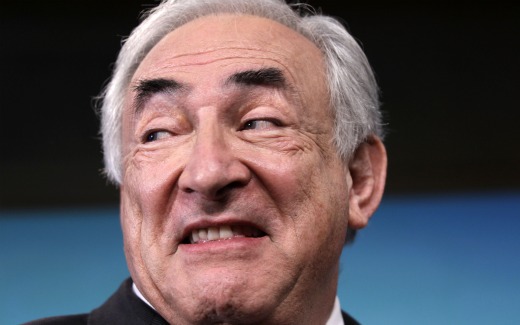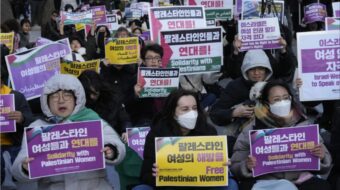
The recent indictments of Dominique Strauss-Kahn on criminal sexual assault charges are widely seen, especially by women’s rights organizations, as another case of powerful and wealthy men thinking they have the right to sexually exploit women in subordinate positions. The charges against Strauss-Kahn include attempted rape, sexual abuse and unlawful imprisonment of a hotel housekeeper.
Unfortunately, many corporate media reports are treating the case more as a matter to titillate their audience than as a serious story to explain. Strauss-Kahn, like anybody, is innocent until proven guilty in a court of law. And the accuser also has rights, which should be respected.
The incident has wide political implications. In the first place, Strauss-Kahn, a French citizen who is head of the International Monetary Fund since 2007, was being talked up as the probable candidate of the Socialist Party in the April 2012 presidential elections in France. The poll numbers for the incumbent, rightist Nicolas Sarkozy of the Union for a Popular Movement, are rock-bottom low, so Strauss-Kahn was seen as a very likely future president.
The scandal knocks him out of the running, and it remains to be seen whether any other Socialist Party politician can win.
Some in France have suggested Sarkozy operatives are behind this case. This is far-fetched. But it is certainly true that for the moment, the scandal has probably helped either Sarkozy or the leader of the far-right National Front Party, Marine Le Pen.
The French Communist Party, in a statement on its website, pointed out that rape is a serious crime and that the U.S. justice system should do its job. The party also said the French people have very important political issues to deal with and should not allow themselves to be distracted by a sleazy scandal.
It is possible that the fall of Strauss-Kahn may have a worldwide impact on the IMF.
The IMF and World Bank were established in 1944 as a result of an international conference at Bretton Woods, N.H. The IMF eventually became a major source of development aid, especially for poorer countries.
However, the IMF has always, by design, been dominated by wealthy European countries plus the United States. Votes on the IMF governing board are allotted on the basis of the size of the economies of the member countries (most countries in the world), rather than the size of their populations. Thus France, with its population of 62 million, has 107,635 votes, while India with a population of nearly 1.2 billion, has only 58,832 votes. Moreover, major decisions require an 85 percent majority, further strengthening the Euro-American hegemony.
This, along with the “tradition” that the head of the IMF must be a European, has meant that the IMF has acted as an instrument of the interests of the ruling classes of the wealthy imperialist countries. Especially after the fall of the Soviet Union and the other European socialist states, poor countries have been caught between having to accept IMF and World Bank dictated “structural adjustment” policies, or forgoing help.
Structural adjustment means that in order to get loans from the World Bank and development aid from the IMF, countries have to open themselves up to bogus free trade, privatize their state enterprises and many services, and cut public budgets to the bone. This has led to an impoverishment of wide sectors of the populations of already poor countries, and serious damage to health care, education and other public services.
A very small number of countries have simply refused to cooperate with these policies. Most notably, Argentina thumbed its nose at “structural adjustment,” and has been better off for doing so. But few have dared to imitate that example.
There have been many attempts to find ways to end reliance of poor countries on the Bretton Woods organizations. The integration attempts in Latin America, including the Bolivarian Alliance for the Peoples of our America, UNASUR and MERCOSUR, have sought to better coordinate regional aid and development resources.
And recently, the rise of the BRICS group of countries (Brazil, Russia, India, China and South Africa) as a powerful economic bloc has shown signs of being a game-changer, even as some crisis-wracked European countries look to the IMF for help.
The BRICS countries have been pushing within the IMF to change the way it does business, and to some small extent, Strauss-Kahn was open to this. For example, he was willing to reconsider the dominant role of the U.S. dollar.
But now all this is up in the air. American corporate economist Joseph Lipsky has replaced Strauss-Kahn on an interim basis. The international media are pushing the idea of French Economics Minister (and IMF governing board member) Christine Lagarde to permanently replace Strauss-Kahn.
As a member of Sarkozy’s conservative government, she would be likely to promote the status quo. On the other hand, the BRICS countries and other poorer states are calling for an open process in which the “traditional” selection of a conservative European figure is set aside, giving them a chance to push for fundamental changes.
Yet other countries, such as Cuba, see a necessity to replace the entire Bretton Woods setup with a new system based on international equality and solidarity.
Photo: Dominique Strauss-Kahn (AP Photo/J. Scott Applewhite)












Comments